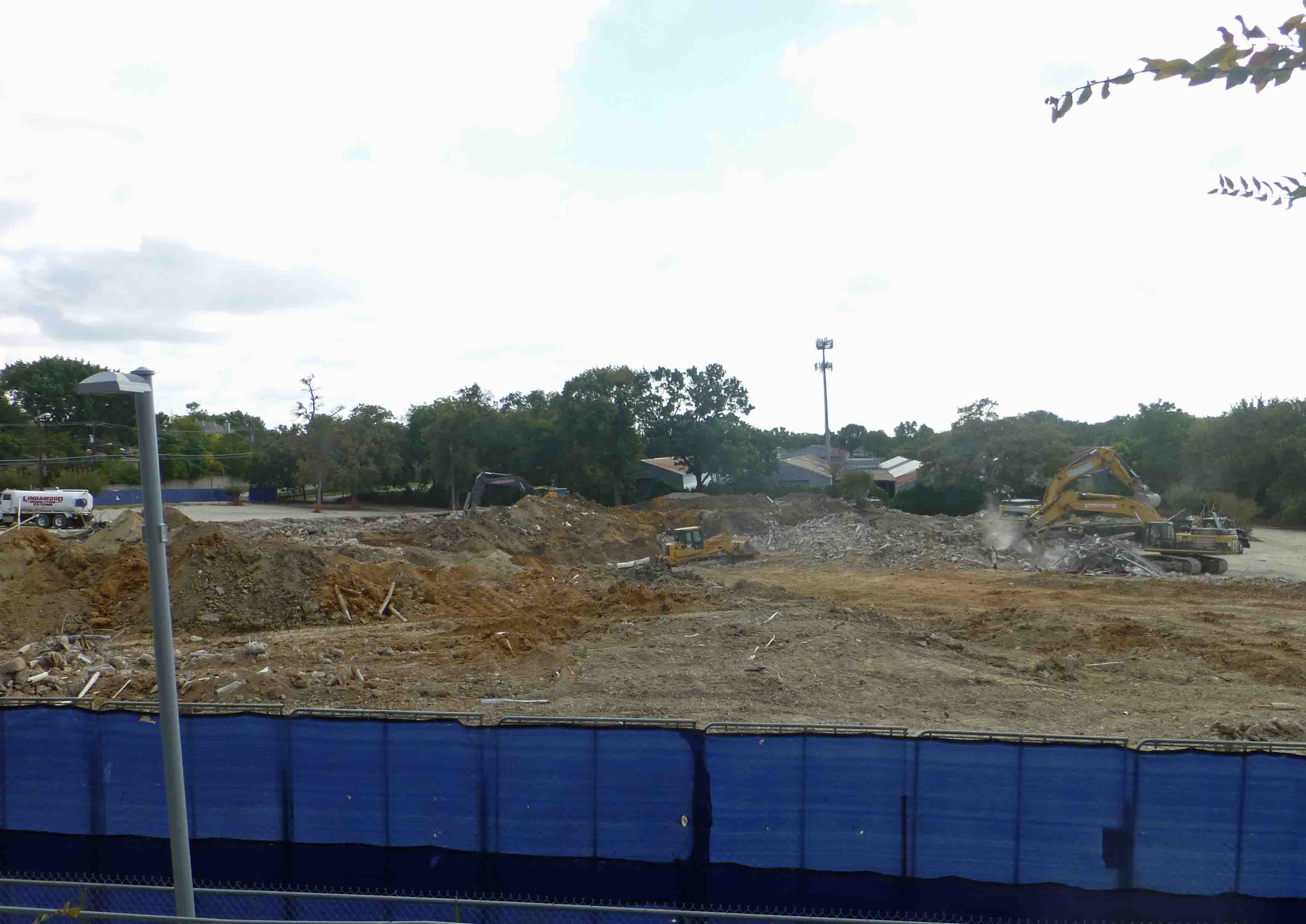
RISD’s property on White Rock Trail is now virtually scraped clean of two office buildings. Photo by Carol Toler 11/1/16.
In September, representatives from the Richardson ISD and the City of Dallas met informally to hash out the challenges of developing the district’s recently acquired property at White Rock Trail and Walnut Hill. The site is small, it slopes downward toward the DART tracks, it is not accessible from Walnut Hill due to a DART easement and there are no sidewalks along the two-lane White Rock Trail. In addition, deed restrictions, lobbied for by neighbors and approved by the City in 1978, set out a list of approved uses for the property.
A school isn’t one of them.
The meeting wasn’t public, but the results were. Though it cost $900,000 more to build, RISD approved one of two designs which required no approval from the City for height and setback variances. Perceiving an “end run,” the City reacted by making a notation on RISD’s permit to demolish office buildings on the tract: “Note: school not permitted on this site.”
And the fight was on.
Detailed architectural plans are currently being drawn, and RISD is expected to apply for a construction permit when they are completed in December. The City has indicated that permit will be denied.
So what happens next?
It’s possible that trustees will vote to abandon plans to build on the site based on neighborhood opposition. RISD Interim Superintendent Dr. Jeannie Stone recently hosted a meeting with neighborhood leaders, where she entertained alternatives to building on White Rock Trail. One option, discussed at a later work session by trustees, included shifting some WRE students to an enlarged Northlake Elementary, enhanced by magnet programs. In addition, said Trustee Jean Bono at the work session, the district continues to look for alternative sites for an elementary school in the White Rock area.
If, on the other hand, the district pushes forward with White Rock Trail plans and the City stands firm, what could voters expect?
My questions to RISD General Counsel Mia Martin went unanswered, but I received this statement from RISD spokesman Tim Clark: “Ms. Martin cannot discuss any privileged communications with her clients. However, RISD always would consider litigation to be a last resort to address this or any issue. It’s important to Dr. Stone that the district move forward with a solution to address enrollment growth in the White Rock area that has the support of the WRE community, if possible. No decision regarding litigation would be made until other options to address WRE’s growth were exhausted.”
In August, Martin stated that “while the matter is somewhat complicated and RISD continues to work with the City of Dallas, the district believes it can legally build a school on the site.”
Sources within RISD say district lawyers have not accepted the premise that the deed restrictions apply to RISD at all, due to RISD’s status as a school district. They say Martin contends that this concept has been upheld several times in Texas case law.
I’m no lawyer, so I asked for a little background help from Tom Keen. Keen now practices commercial real estate and business law at his private practice in Plano, but he was a former assistant city attorney in Dallas under Analeslie Muncy in the 1980s.
“Deed restrictions like these exist all over town,” Keen told me. “They are not that unique. The school district believing they are not bound by them is just a prayer on their part. The school district bought this property with knowledge of the deed restrictions. They may say they aren’t bound by them, but saying it doesn’t make it so. If a use is not permitted by the deed restrictions, it is not permitted.”
I asked what legal options RISD might have if their design plans are denied.
“They may appeal to the board of adjustment, which is a less political body,” said Keen “but the RISD is not exempt from city building codes. If you meet the requirements, you get a permit.”
And if the RISD’s request for a construction permit is denied because of the deed restrictions and RISD sues, what might a judge say?
“The judge would likely say that the school did not exhaust all of its administrative remedies,” said Keen. “RISD is taking a risk here. There is a procedure in place that must be exhausted, or the case is not ripe for adjudication. The process set out in the deed restrictions is basically the same as a zoning change. The school district requests a public hearing before the planning commission and the city council. The decision will be based on what’s best for the land use, but they’ll also listen to the audience. These two organizations – the city and the school district – are on equal footing, although as a general rule, city zoning laws cannot prohibit the reasonable location of schools. The city did not impose the deed restrictions. They were imposed by private property owners. The city has the right to enforce them.”
Putting the ball in the city council’s court could get interesting. Dallas City Councilman Adam McGough has said he remains “intimately engaged” in the process, receiving and reading hundreds of emails from constituents on the subject. Most observers agree his fellow councilmen are likely to vote with him on the issue in his district rather than side with the Richardson ISD. He has said voter emails lean 85% against the site.
The city has another right, said Keen. “The school district has the power of condemnation, a power they have not yet exercised.”
Condemnation, or acquisition of rights over the deed restrictions via eminent domain, “may be problematic,” said Keen, “because RISD has to make an offer prior to initiating condemnation, and it is not clear to me right now to whom they would be making the offer. It would have been cleaner to condemn the site as part of the purchase.” It’s one thing to compensate a property owner for acquisition of land via eminent domain. Who receives compensation when deed restrictions are condemned?
“Here’s another interesting twist,” added Keen. Suppose the City does issue a permit. Who has the right of appeal? “Anyone aggrieved by the decision – likely anyone living in the attendance zone of the school,” said Keen.
The RISD has hired a consulting firm, Stantec, “to assist the district with immediate and long-term enrollment growth and facilities planning.” Although their report is not expected until the spring, their action plan and timeline will be laid out at the regular board meeting Monday, November 7th at 6 p.m. at the RISD Administration Building.





